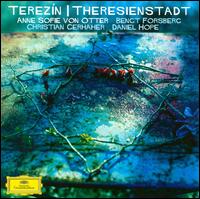"I Shall See You Again."
 It is rather daunting to approach this new release from Deutsche Grammophon, not because of the material itself -- indeed, it is full of surprises and charm -- but rather because all but two of the composers represented died in the Holocaust.
It is rather daunting to approach this new release from Deutsche Grammophon, not because of the material itself -- indeed, it is full of surprises and charm -- but rather because all but two of the composers represented died in the Holocaust.Most of you are likely familiar with the story of , or Theresienstadt, where so many Jewish artists were imprisoned in the midst of the Second World War. Among the inmates were such multi-talented figures as the writer Ilse Weber, jazz musician Martin Roman, composer Hans Krasa, and Karel Svenk, an actor, producer, and writer famous for his cabarets.
This disc includes works by all of the aforementioned, plus selections from Pavel Haas, Emmerich (Imre) Kalman, Erwin Schulhoff, Adolf Strauss, Carlo Taube, and Viktor Ullmann. Given that so much of the work of these composers was either lost, suppressed as "degenerate," or created to be heard by their fellow prisoners, it is remarkable that we have this recording before us.
And I do hope it will be noticed and heard by many. It's a good bet that many listeners will be astonished by the variety of moods, languages, and idioms here: a violin sonata from Schulhoff, a lullaby from Weber, an unabashedly romantic love song from Strauss, a parody set to a selection from one of Kalman's operettas, and musical settings of poetry from some surprising sources. Expect challenges. Expect surprises.
And expect a phenomenal array of talent for the project. Mezzo-soprano Anne Sofie von Otter and baritone Christian Gerhaher are joined by their accompanists, Bengt Forsberg and Gerold Huber, respectively, as well as a talented instrumental ensemble. Violinist Daniel Hope appears solo on the final four tracks of the album.
Von Otter in particular is a joy. Her voice remains radiantly youthful yet resolutely grown up, emotionally expressive yet neither maudlin nor arch. She shifts moods deftly, too: nostalgic sweetness for Adolf Strauss's "I weiss bestimmt, ich werd' dich wiedersehn" ("I Know for Certain I Shall See You Again"), exquisite tenderness for Weber's songs. Pianist Bengt Forsberg partners her beautifully, particularly in the latter selections.
Our second vocal soloist, Christian Gerhaher, has a voice of pleasing balance: dark enough to convey gravitas, light enough to let the material soar. That's as it should be, given that he has to move from operetta to art song in the course of this album.
But as the album concludes, both singers give way to Daniel Hope and his interpretation of the 1927 Sonata for Violin Solo by Erwin Schulhoff. This seems fitting, too; perhaps it's to give the composer the last word.
As we approach the , let us see these names once more -- Haas, Krasa, Svenk, Weber, and so many others -- let us hear them, let us remember, and above all let us respond.




0 Comments:
Links to this post:
Create a Link
<< Home